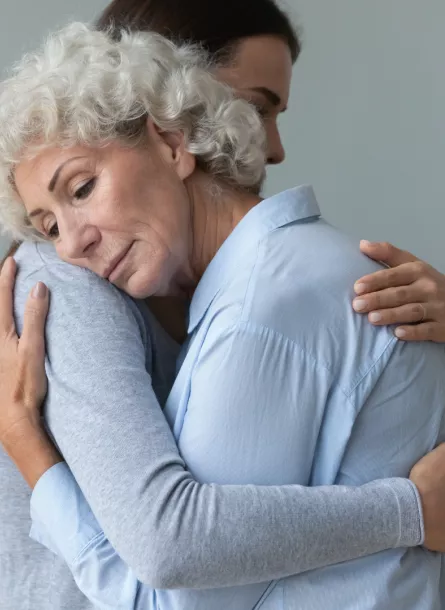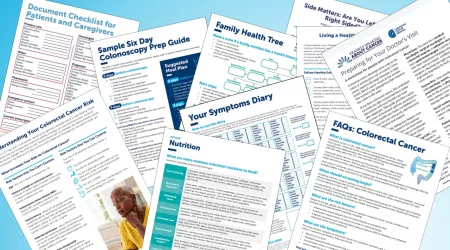
Grief resources for family and caregivers
As a caregiver, you may need to learn to heal differently than others.


Loss as a caregiver
People experience grief differently. As a caregiver, it can be a especially difficult. Your feelings of loss may be mixed with guilt, relief, and uncertainty over the future. Remember that you are not alone.
Time to heal
Give yourself time to get used to the ways things have changed. Acceptance will not happen overnight, but you will adjust after some healing.
A new routine
It can feel very strange to find that your routine no longer centers around your loved one. It’s normal to feel lost and confused about how to spend your time.
Symbolic loss
Many caregivers find they miss the relationships they’ve built with their loved one’s medical team, or they miss caregiving and the purpose and joy these duties gave them.
Relief
It’s okay to feel relief after a loved one has died. Feeling liberated from your caregiving duties doesn’t take away from your dedication to your loved one.
Time
There is no timetable for grief. Expect to feel "okay" one day and completely overwhelmed with sadness the next. The erratic nature of emotions tends to decrease and diminish in intensity over time.
Questioning
Many people who are grieving have questions that don’t have easy answers. Questions like, "Why us?" and ‘‘Is there really a higher power watching out for us?" These questions about the meaning of life and spirituality are natural after loss.
Find support
If you find that sleep deprivation and anxiety lasts longer than a few months, consider reaching out to a mental health professional. Local in-person or online grief groups are helpful to get support other caregivers. You can also be matched with a Caregiver Buddy on our Helpline at (877) 422-2030.
Managing your peace after loss
Your loved one has died and your heart is broken. You struggle to put one foot in front of the other, to perform simple functions at home and work, to find some meaning in their death. But most of all, you struggle to find a way to cope, to mourn, to grieve.
As you begin to put back the pieces of your life, you will find some don’t fit anymore and surprisingly, you will find new pieces that comfort you.
Simply put, grief is a natural reaction to loss.
It hurts, it is debilitating and painful
The American Society of Clinical Oncology suggests:
- Allow yourself to experience the pain of loss. As much as it hurts, it is natural and normal to grieve.
- Talk with others. Talking about your loss and sadness with others may help you process and release your feelings.
- Find creative outlets. Consider expressing your feelings through creative activities you enjoy such as music or art.
- Engage in physical activity such as walking, running, or riding a bicycle – to help you cope with your feelings.
- Give yourself a break from grieving. It is important to take breaks from grieving with pleasant activities and interactions with supportive family members and friends.
- Maintain a routine. Keeping a basic routine of daily activities helps you structure your time and keeps you connected to familiar people and places.
- Forgive yourself for the things you regret doing or saying to your loved one.
- Be patient. Allow your grief to unfold at a pace that is natural for you.
- Take care of yourself. It is important to attend to your physical needs during the period after loss.
- Join a support group. Support groups offer you the chance to talk with others who have similar experiences.
Tips that really help
From the book Awakening From Grief by John E. Welshons:
- Let your tears feed your heart
- Tell your story
- Remember the value of ceremony
- Open to the possibility that the universe is not perfect
- Become aware that no relationship is ever lost
- Create a sacred space of remembrance, start a garden or create a space with your loved ones pictures, candles, favorite poem
- Write a letter to the loved one who has died
- Keep a journal
- Find safe and appropriate outlets for your anger
- Find forgiveness
- Incorporate meditation, contemplation and prayer into your daily life
- Be more mindful of your own physical health
- Be creative
- Laugh
- Consider getting a pet
- Relax and take your time

Online support
Survivors, caregivers, friends, and family members from across the world who know exactly what you’re going through. Join them on BlueHQ, our free patient and caregiver platform.

Our buddy program
Our certified Patient & Family Support Navigators are here to connect you with a vetted Buddy who has been through a similar situation to offer meaningful and useful advice.

Grief chat room
Connecting with other family members and caregivers can be a helpful way to find support and get answers. Try our online chat group to talk to someone who is going through a similar situation.
More caregiver resources
Caregiver stress and burnoutTop resources

Colorectal cancer resources for learning and sharing
Whether personally impacted by colorectal cancer (CRC), supporting a loved one, or dedicated to educating and empowering others, these downloadable and printable resources can help.

Don Shippey: from stage IV to six years cancer-free after receiving HAI pump
Don Shippey was 55 years old in 2016 when he decided he’d been putting off his colonoscopy long enough.

Pet therapy for cancer patients
Pets can be an incredible source of comfort and joy for anybody but, for cancer patients, pet therapy can provide emotional and psychological support to enhance a person’s overall well-being.





